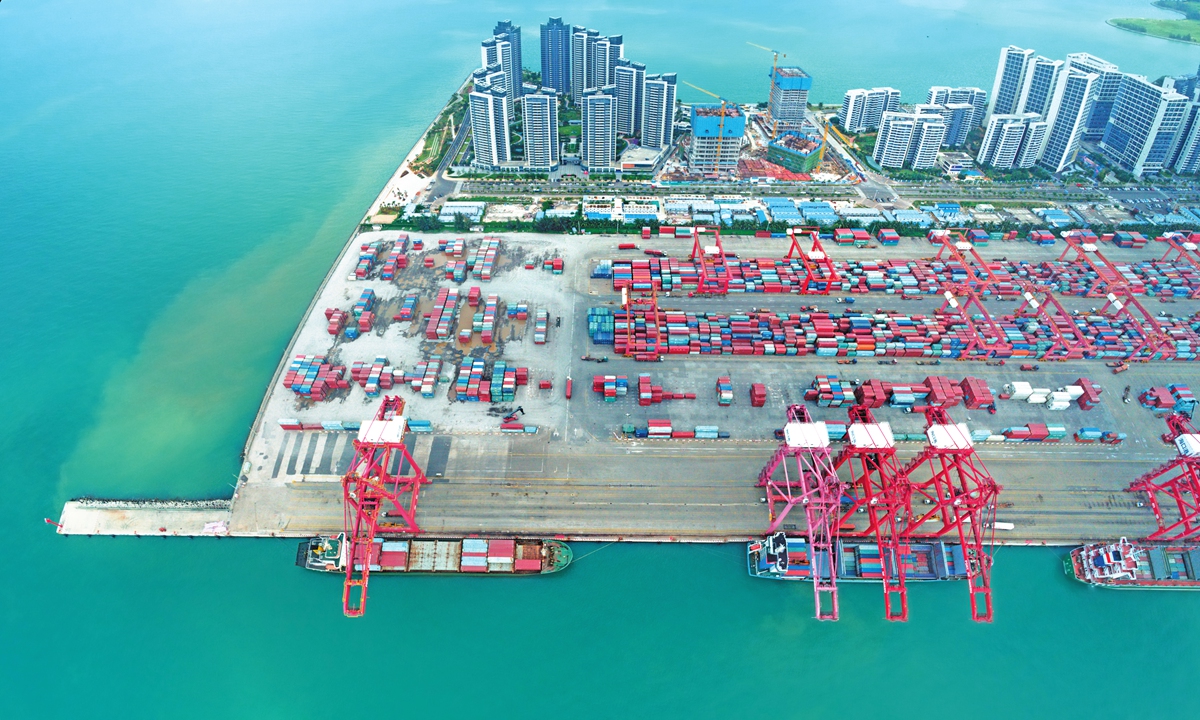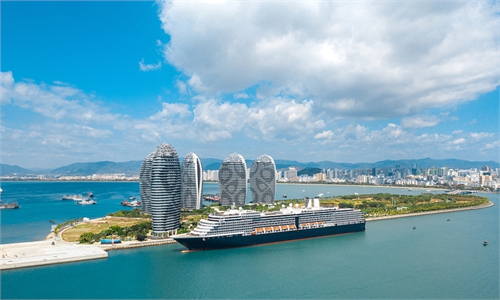
Haikou Xiuying Port in South China's Hainan Province Photo: VCG
Looking at the lush rainforest that stretches out along the shore line, Tan Wenhua, a veteran venture capitalist from Beijing, said he had big plans for the Hainan pilot free trade port (FTP).
China too has big plan for its southern island province. Hainan will be transformed into an island-wide FTP over three stages in 2025, 2035 and 2050 with the FTP becoming an independent customs regime by 2025. The Hainan FTP will gain "global influence" and play an important role in China's continued opening-up and expansion of foreign trade.
Business people from across China are exploring new boundaries for the Hainan FTP, with many saying that innovative approaches and institutional reforms are needed in order to turn the tropical island into a paradise for free trade.
For Tan, a tech investor who arrived in Hainan last year to grasp the opportunity presented by the FTP, the job of turning Hainan into a world-class FTP needs innovation.
"Hainan has the best natural environment in China. People come here could see coconut trees, rainforest and the sea. Then they will find there is nothing more to be seen here," Tan told the Global Times.
Despite the rollout of more than 150 supportive policies over the past four years, experts have claimed that for Hainan to become a world-class FTP comparable to Hong Kong Special Administrative Region, Singapore or Dubai remains , simply copying the experience of these free ports won't be enough.
The island's weak agriculture and industrial development, as well as its COVID-hit tourism sector mean it could not win a conventional competition of "attracting investment, setting up industries" with at least more than a dozen provinces on the mainland determined to do exactly the same thing, even with its policy advantages which include offering zero-tariffs for a wide range of imports.
To Tan, Hainan's free trade fortune lies in neither the much-trumpeted tax-free shopping nor conventional tourism, but exists in the mission "to showcase, broke and generate transactions," serving the world's procurement managers.
"Many of the great designs currently the central government has for Hainan, such as offshore financing and yuan internationalization, would be castle in the air without transactions being generated on the island," Tan said.
Tan advocated a novel approach to the convention and exhibition business, inviting companies and countries from around the world to come to different townships in Hainan to set up their unique, all-year-long showrooms to display their products.
German industrial complex, Israeli high-tech park, and Swedish deep agricultural processing site could be among those demonstrated in an immersive, scaled-down style across Hainan's different townships, Tan said, adding that his platform for agricultural commodity exchange has engaged in tentative discussions with delegates from a dozen countries and more than 30 domestic companies from the mainland.
"By then, as people from all over the world come to the island, on a visa-free status, they can not only see coconuts, rainforest and the sea, and beyond that, they could also see permanent showrooms filled up with the best products from around the world, in a word, they see the world in Hainan," Tan said.
If deals can be brokered, and transactions happen, as numbers build, Hainan will become a real FTP with global influence acting as a global offshore trading center for the yuan, Tan said.
Institutional reforms
If innovation is Tan's pursuit, exploring institutional leeways within the FTP is the goal for others.
International diving certification firm PADI set up a branch in Hainan in 2021. Lou Yan, president of PADI China, told the Global Times over the weekend that her company wants to jointly explore the limits of current regulations with local governments and see if some institutional innovations could be made so that there will be more diving areas without undermining the ecological sustainability on the island and diversified diving services made more available.
Currently, there are only two diving spots on the island, limiting the potential of the diving industry even as the COVID-19 pandemic has forced China's divers to flock to the island.
"Tax-based benefits are a contributing factor, but it is the perceived openness of the local government that attracts us the most as we would like to explore flexibility in the regulations that govern diving activities and other water sports," Lou said.
PADI's business stands to benefit from the development of the Hainan FTP. Once the visa-free policy is implemented, it will be easier for PADI to send dive masters to teach courses on the island, Lou said.
Although 75 percent of divers from China still dive and get certified in Southeast Asia, Lou believes the diving market in Hainan has significant potential once the current restrictions are removed, as the island's mature tourism infrastructure is more suited to the demand of China's middle-class tourists than that of backpacker-centric Southeast Asian countries.
Pilot program
In addition to the free flow of production factors and spirit of reform, there are also companies banking on the FTP's newly announced facilitation to aid their business growth in China.
Bai Ming, deputy director of the Chinese Ministry of Commerce's International Market Research Institute, told the Global Times on Sunday that a more streamlined approval process for the medical care and nursing industries is a highlight linked to the opening-up of the Hainan FTP.
In Lecheng, one of the 11 key pilot zones under the Hainan FTP, global drug-maker AstraZeneca is focusing on the application of real-world data for certain novel drugs in Chinese mainland with the hope to further contributing to the nation's fight against COVID-19.
"We will work with the Hainan Boao Lecheng International Medical Tourism Pilot Zone Administration to realize the pilot trial of Tixagevimab and Cilgavimab, two pre-exposure prophylaxis used to treat COVID-19, in Hainan as soon as possible," Leon Wang, executive vice president of AstraZeneca, told the Global Times during last week's Boao Forum for Asia 2022.
Since the plan for building a world-class FTP was announced in 2018, the province has seen rapid progress. In 2020-21, the province's average GDP growth stood at 7 percent, one of the fastest growth rates in the country.




